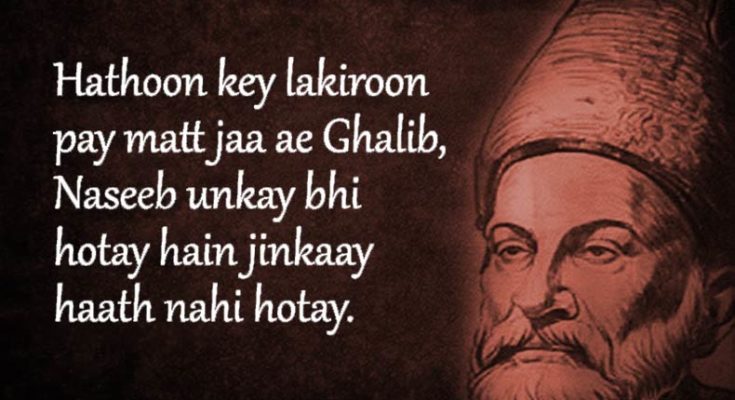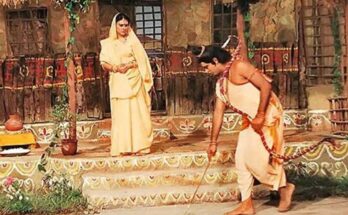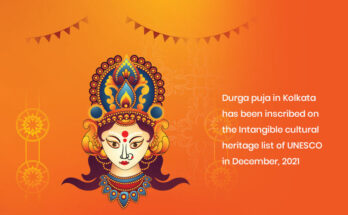Mirza Ghalib in Google doodle – introspection of a great poet.
“Hazaaron khwahishen aisi ke har khwahish pe dam nikle
Bohat niklay mere armaan, lekin phir bhi kam nikle…”
(Translation: I have a thousand desires, all desires worth dying for,
Though many of my desires were fulfilled, many remained unfulfilled.)
– A big tribute to the ‘king’ of Urdu Poetry on his 220th birth anniversary.
Google has given tribute today to the great soul on his 220th birth anniversary.
Mirza Asadullah Baig Khan was born at Agra, India, on 27th December in the year 1797. He had an inborn flow of poetry in his mind and started writing poems in Urdu at the age of 11. He contributed a lot to the Persian language, also.
He had his marriage at a very early age of life, just when he was only 13 years old, according to privileged Muslim custom and settled in Delhi. Later, he had 7 kids, but none of his kids survived more than 15 months. These ceaseless shocks and sorrow covered up his mind in such a way that it actually reflected in his poems. Each of his poems incorporated with deep penetration of sorrow that made them unique and wonderful in the form of ghazals.
A huge number of Urdu poets were born and created so much poetry in Urdu since 1810 in the South Asian region, but very few of them could make a watermark like this. It is the pain of life that made Mirza Ghalib the ‘king’ in his Urdu poetry expressions.
Mirza Ghalib’s ghazals have been translated into various languages around the world. The Mughal emperor Bahadur Shah Zafar II honoured him with the title of “Dabir-ul-Mulk” in 1850.
He was actually a gift from God. He was integrated with so much talent that poetry used to come from his mind as a flow of water. Each of his poems used to contain deep thoughts and inner feelings with an optimum level of imagination.
Ghalib was an important member of the Mughal court during the last phase of the Mughal era. He was also blessed as ‘royal historian’ of the Mughal court and tutor of ‘Prince Fakr-ud-din Mirza’, the eldest son of the Mughal Empire at that time.
Read: Mirza Ghalib – One of the greatest poets of South Asia
The ‘king’ of Urdu poetry expired on 15th February, 1869, at Delhi. His house turned into the ‘Ghalib Memorial’ that showcases exhibitions of his works. Nobody knows how many expectations he had from his life, but very little he could manage to get very little in his lifetime. He realised the fact of his life and predicted that his contributions would be recognised by later generations, but not in his lifetime –
“Na tha kuchh to khuda tha kuchh na hota to khuda hota
Duboya mujh ko hone ne na hota main to kya hota
Hua jab gham se yuun be-his to gham kya sar ke katne ka
Na hota gar juda tan se to zaann par dhara hota
Hui muddat ki ghalib mar gaya par yaad aata hai
Woh har ik baat par kahna ki yuun hota to kya hota”
(Line 1 & 2 Translation: When there was nothing, God was there.. If there had been nothing, there would have been God. In emptiness, God would still exist. In nothingness, only God would exist. In the beginning, nothing was there, except God. If there had been nothing, God would have still been there. My existence has let me down. Becoming (My being) has defeated me. If I did not exist, what would I be? If I did not exist, what harm would it be?
Line 3 & 4 Translation: When the mere existence has become a burden and a curse by the pain and suffering all around, then what is pain at the head being cut off? My loss of faith in God has made life such a misery that death looks to be the only solution, and I have no qualms about it. If it had not been cut off (for God is merciful, and He would spare my life from this violent death), it would always be bent to my knees in devotion to God to make amends to my faithless and immoral existence.
Line 5 & 6 Translation: A long time has passed since Ghalib passed away, but he still comes back to the memory. Saying every time that had it not been this way, then how it would have been? The contemplation that if I had lived my life differently [followed the correct way], what would I have been? Would it have mattered? Would it have amounted to anything other than death, because eventually death is the final Truth?)
Reference: NDTV, Rekhta, Ranjish, Storypick, Allpoetry.





